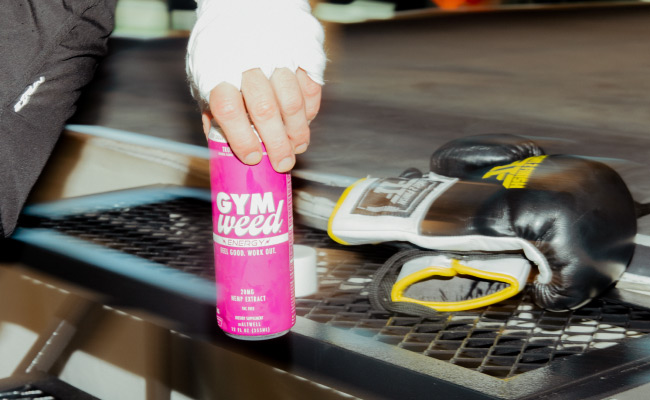The original founding team behind Muscle Milk is using a similar playbook of incremental distribution in gyms and specialty fitness retailers to grow a new hemp-infused, energy drink called Gym Weed.
The beverage launched in March in 12 oz cans with three flavors: Pear Pineapple, Stone Fruit and Tropical Berry, each priced between $3.49 and $3.99. After starting exclusively in D2C, Gym Weed has quickly moved into about 500 gyms and specialty retailers with a distribution network of Europa Sports, DNA Distributors, NYB Distributors and L&E Distributors.
Gym Weed is one of several energy drink players – including Rockstar and Kill Cliff – that have looked to hemp as a launchpad for innovation. Its drinks pair 200 mg of green tea caffeine with the anxiety-relieving properties of 20 mg of hemp extract, along with adaptogens like Lion’s Mane and L-Theanine, to deliver a fitness-focused, zero-sugar energy drink.
The company currently stands at about 15 employees, having recently brought on John Blair, the former head of sales at Muscle Milk, to help grow distribution.
The hemp beverage brand evolved out of Alternative Biologics which was started by the Pickett Family, the founders of CytoSport Holdings. The company launched the Muscle Milk brand in the early 2000’s as a protein powder product but found widespread success as a pioneer in the RTD protein beverage category sold in gyms and specialty nutrition stores. The brand would later expand further into mainstream retail stores with other products like bars and oatmeal.
The Picketts sold CytoSport to Hormel in 2014 for $450 million and PepsiCo would later buy the brand in 2019 for $465 million.
The strategy with Gym Weed is very similar to how the team approached Muscle Milk – to own the specialty market, in the words of Shane McCassy, President of ALTWELL, the CBD wellness brand within Alternative Biologics that is producing Gym Weed. “Gyms and specialty retailers have a customer base that is engaged. They know the latest ingredients and are open to trying new things.”
The brand didn’t look at the current hemp-infused beverage market as its “North Star,” McCassy said, but instead looked to successful brands in the fitness-energy category like Celsius and Alani Nu to carve out a space in the “fast-growing, but still relatively small market.”
Though still in its nascent phase, the hemp-based beverage market only shows signs of growing. According to Data Bridge Market Research analyses, the cannabidiol (CBD) infused beverages market was valued at $2.83 billion in 2021 and is expected to reach $8.96 billion by 2029, at a CAGR of 15.50%.
McCassy hopes to build on that market potential but at a pace that feels natural to the brand. In its first 12 months, Gym Weed is planning to slowly build its consumer base and distribution in the gym-specialty channel. It has begun to test the waters of DSD distribution with a limited presence in markets like New York City where the brand hopes to find a foothold in C-stores and eventually grow into grocery, mass market and club retailers.
Gym Weed is currently using the same offices in Benicia, Calif. as Muscle Milk and shares the building with Pickett Family-owned, flavor-ingredient manufacturing company, Flavor Insights. Flavor Insights pre-packages the ingredients before they go to the co-packer, and also assists the brand with product R&D.
“We did over 100 versions of the formula to get to the final one,” McCassy said. “And when we’re saying ‘Hey, we want to do a new flavor.’ We just walk across the hall and talk to the (Flavor Insights) team.”
The rise of social media-based influencer marketing, however, means Gym Weed will take a different approach to growing awareness compared to Muscle Milk, which initially invested heavily in print media ads featuring partner athletes like Stephen Curry, Clay Matthews and Clayton Kershaw in fitness magazines like Men’s Health and Muscle and Fitness.
“Back then you looked for somebody who had a strong image and likeness that you could run ads with and build retail programs with,” McCassy said. “What’s changed is now you look for people that have a good social footprint.”
Gym Weed has already signed brand partnerships with model/wellness influencer Alexis Ren and celebrity trainer Melissa Alcantara who have strong digital presences.
That’s not to say that Gym Weed is not setting its sights on even bigger opportunities.
The recent news that Major League Baseball will allow hemp/CBD partnerships is a positive sign for new entrants into the energy-fitness beverage space, but at the moment there are no plans to get the required NSF for Sport certification required by the MLB.
“We’re really in a learning phase. Building our core customer base, building our brand, building our community with no real rush,” McCassy said. “We’re running the business lean and mean, but trying not to be penny wise and pound foolish.”


